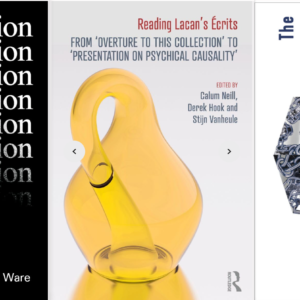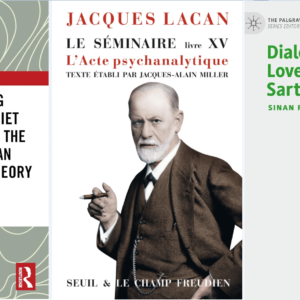News – April 2013
With the DSM-V, the Diagnostic and Statistical Manual of Mental Disorders, due to be published on 22nd May, opposition and concern has been expressed throughout April from all corners of the psy- field (summary here). Whilst Lacanian opposition to the DSM is well-known and well-documented, many other high-profile professionals and institutions have lined up to register their protest. The latest of these, in the last week, has been the National Institute for Mental Health in the US. The NIMH has declared its desire to move away from the DSM in favour of collecting data needed for a new nosology (however, as Lacanian analyst Christos Tombras has pointed out, the NIMH’s aspiration to move away from the DSM is based on the rather simplistic faith in the purely “cognitive, circuit, and genetic aspects of mental disorders”. The bio-medical model of mental disorders has been also been criticised on this side of the Atlantic by the British Psychological Society (more here).
Perhaps Chief among the opponents of DSM-V is Dr Allen Frances, whose new book ‘Saving Normal’ will be released shortly to coincide with the publication of the DSM-V. Dr Frances is best known as the former Chair of the committee which put together the DSM-IV, but has been especially vocal against its successor, the DSM-V. He is also giving this year’s Freud Memorial Lecture at Kings College next month. More information and how to get tickets is on the Freud Museum’s site here.
Similarly, in his new book, James Davies does a fantastic job of telling the story of the construction of the DSM-III, under the chairmanship of Robert Spitzer, in a chapter of his new book Cracked: The Unhappy Truth About Psychiatry. In his talk in London in early May, ‘The DSM – A Great Work of Fiction?’, he gave a beautiful and very apt analogy borrowed from Paula J. Caplan, a consultant on the taskforce putting together the DSM-III. Caplan made the point in 2006 that the DSM’s “choices about how to cluster symptoms were often no more scientific than astronomers’ choices about how to group stars into constellations.” Just as an astrological constellation is nothing more than a series of separate stars joined together with lines according to how any given culture decides to interpret the night sky, the choice of how to cluster symptoms together into a given disorder can be equally as arbitrary.
On a related note, Lacanian psychoanalyst Darian Leader has a great book out this month on so-called bipolar disorder. Strictly Bipolar argues for a reconsideration of the concept of manic-depression in place of the burgeoning diagnosis of bipolar and the many different sub-categories it now has. As he did in his last book, What Is Madness?, Leader takes his cue from French psychiatrists of the nineteenth century such as Jean-Pierre Falret and Jules Baillarger. For a taster of the book, check out this article he wrote for The Guardian in April, or this one last year. Leader also discusses his work on this subject on the BBC’s Night Waves programme, which you can listen to here.
The full programme for the conference Reworking Lacan at Work, taking place in Paris on 14th and 15th June, has now been published. A synopsis of the conference is here. There are some great speakers lined up but, more importantly, fascinating-sounding topics for discussion. To name just a few – ‘Budgeting with Lacan and Levi-Strauss’; ‘A Lacanian Perspective on Career Progression’; and ‘Reification and efficastration: essay on a link between critical theory and clinical study of narcissistic injuries at work’. Simultaneous translations will be provided for the sessions indicated in the programme (which seems like most of them that are not already in English).
On 18th and 19th May the XIth NLS (New Lacanian School) Congress will take place in Athens on the subject of ‘The Psychotic Subject in the Geek Era’. Ahead of this, the blog of the Congress is being regularly updated with contributions from different perspectives on this topic. Some are in English; some in French. They can all be found here.
The latest edition of Hurly-Burly, the bi-annual International Journal of Lacanian Psychoanalysis, is out. You can now also get hold of the journal from London-based Karnac Books (for those who don’t want to navigate through the ECF’s own bookshop). Although a relatively young journal (it was set up in 2009 as a replacement for the bulletin of the New Lacanian School), Hurly-Burly has gained a reputation as being a premier publication in the Freudian Field. The list of contributors is a who’s who of the Lacanian world, and the topics are refreshingly relevant to contemporary issues rather than simply re-treading familiar ground. For the full contents see the NLS site here.
The London-based Centre for Freudian Analysis and Research has published its summer term seminar programme and more details of its summer conference. The programme of public seminars runs every Saturday until 29th June, after which is the Centre’s annual conference on 6th July in Regent’s Park. This latter looks at new perspectives on child analysis, presenting work done by the Centre’s Child Analysis Working Group. A series of three sessions form the Short Course on the subject of unconscious phantasy and run throughout May alongside the public seminar programme. CFAR will also be holding an open morning on 29th June in London for those interested in pursuing their Psychoanalytic Studies course or the full psychoanalytic training they offer. All the details are on www.cfar.org.uk.
A directory of institutions that are members of the EuroFederation of Psychoanalysis will shortly be published under the name of the PIPOL Network. You can already find a Directory of Regions of the EuroFederation and a Directory of Associates (or ‘Adherents’) on its site. The EuroFederation of Psychoanalysis is a European body created in 2010 chiefly concerned with the political status of psychoanalysis and its representation to policymakers on subjects around so-called ‘mental health’. PIPOL is the name of the European Congress of Psychoanalysis – PIPOL 6 will be held in Brussells on 6th and 7th of July ‘After Oedipus – Diversity of the psychoanalytic practice in Europe’ (more information). The EuroFederation also publishes the journal Mental (more on that here). You can read the somewhat convoluted story of its history and current mandate on its site here.
A joint Jung/Lacan conference has been announced for September 2014 to be held in Cambridge, England. Its topic is ‘The Notion of the Sublime in Creativity and Destruction’. From the Lacanian side Bernard Burgoyne, whose long-awaited ‘Neigbourhood of Love’ is now due to be published in December this year, will be speaking. The first announcement about the conference can be found here and the accompanying call for papers here.
Two videos, the first of the introduction and the second of commentary on new disorders of love that formed the subject of Marie-Hélène Brousse’s talk at the Irish Circle of the Lacanian Orientation in Dublin in February, have been made available. Watch them on YouTube here and here.
The École de la cause freudienne is hosting a Study Day on trauma (‘Good and Bad Encounters with the Real’) on the 16th-17th November in Paris. The event is likely to be in French but there is a synopsis that was published in April and which might be of some interest to English-speakers available here.




Leave a Reply